2017-2018学年人教版必修一Unit3traveljournal-usinglanguage课件(42张PPT)
2017--2018学年人教版必修一Unit 3 Travel Journal reading教案 (4)

必修一Unit 3 Travel Journal教案ReadingKnowledge goals1. Important words and phrasesdream about, finally, persuade, stubborn, insist, properly, determined, attitude, change one’s mind, give in.2. Important sentence paternsEver since middle school, my sister Wang Wei and I have dreamed about taking a great bike trip.Two years ago she bought an expensive mountain bike and then she persuaded me to buy one.It was my sister who first had the idea to cycle along the entire Mekong River from where it begins to where it ends.Although she didn’t know the best way of getting to places, she ins isted that she organize the trip properly.She gave me a determined look – the kind that said that she would not change her mind.Once she has made up her mind, nothing can change it.We were both surprised to learn that half of the river is in China.Ability goalsEnable the students to conclude Wang Wei’s and Wang Kun’s attitude to the trip and then add their own opinion with the target language Enable the students to learn how to conclude Wang Wei’s and Wang Kun’s attitudes about trip.Emotional goalsEnable the Ss to find the importance of travel journal.Teaching difficult and important points1. To comprehend the text is very important. Get Ss to express their plans and wishes. Help them learn that traveling is a good way to widen one view and add to one knowledge.2. How to grasp the main idea of the text and how to tell the writer’s attitude.Teaching methodsTalking, discussing, readingClass-exerciseExercise1 Questions:1.What was Wang Kun and Wang Wei’s idea of a good trip?2.Who planned the trip to the Mekong?3.Where is the source of the Mekong River and which sea does it enter?4.What can you see when you travel along the Mekong River?5.What difficulties did Wang Kun and Wang Wei find about their journey?What do you think about Wang Kun and Wang Wei?T: You know Wang Kun and Wang Wei are brother and sister. What was their idea of a good trip?S1: They have dreamed about taking a great bike trip.T: Who planned the trip to the Mekong?S2: Wang Wei.T: What about Question 3?S3 The source of the Mekong River is in Qinghai Province and it enters the South China Sea.T: How about Question 4?S4: We can see a glacier, deep valleys, waterfalls, hills and plains.T: What difficulties did Wang Kun and Wang Wei find about their journey?S5: We know that the travelers had to climb over a Tibetan mountain and pass through deep valleys.T: You are right. Have you ever thought of traveling by bike?Ss: Yes/no.T: What do you think about Wang Kun and Wang Wei?S6: I think they are energetic and determined.T: Quite right. Now I’d like you to tell Wang Wei’s and Wang Kun’s similar and different attitudes about the trip. You can have a discussion with your partners. And then fill in the chart. By the way, do you know the word “attitude”? An attitude is what a person thinks about something. Let’s start.Two minutes is enough. Teacher checks the answers and writes them down on the blackboard while the students are telling their answers.。
人教版高中英语必修一Unit3 Travel journal全解
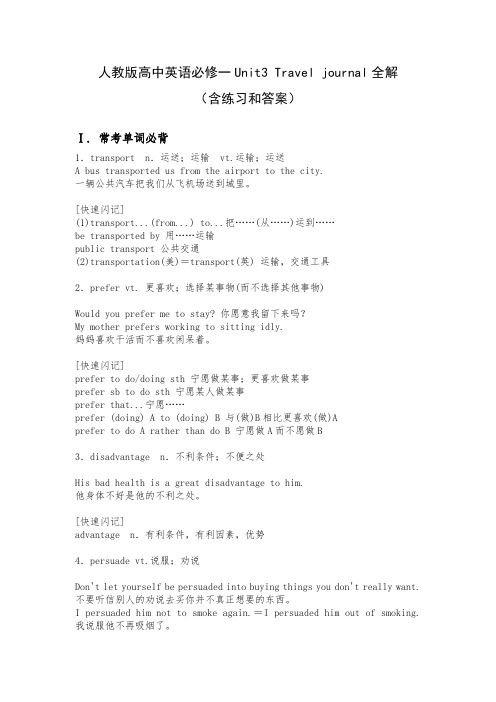
人教版高中英语必修一Unit3 Travel journal全解(含练习和答案)Ⅰ. 常考单词必背1.transport n.运送;运输vt.运输;运送A bus transported us from the airport to the city.一辆公共汽车把我们从飞机场送到城里。
[快速闪记](1)transport...(from...) to...把……(从……)运到……be transported by 用……运输public transport 公共交通(2)transportation(美)=transport(英) 运输,交通工具2.prefer vt. 更喜欢;选择某事物(而不选择其他事物)Would you prefer me to stay? 你愿意我留下来吗?My mother prefers working to sitting idly.妈妈喜欢干活而不喜欢闲呆着。
[快速闪记]prefer to do/doing sth 宁愿做某事;更喜欢做某事prefer sb to do sth 宁愿某人做某事prefer that...宁愿……prefer (doing) A to (doing) B 与(做)B相比更喜欢(做)Aprefer to do A rather than do B 宁愿做A而不愿做B3.disadvantage n.不利条件;不便之处His bad health is a great disadvantage to him.他身体不好是他的不利之处。
[快速闪记]advantage n.有利条件,有利因素,优势4.persuade vt.说服;劝说Don't let yourself be persuaded into buying things you don't really want. 不要听信别人的劝说去买你并不真正想要的东西。
Unit 3 Travel journal 新人教版必修1

新课标人教版 Unit 3 Travel journal 游记核心词汇1.After the flood,many things have been ____________(运送)to the flooded area. 2.I think you don’t know your own ____________(缺点).In fact,no one is perfect. 3.He is so ____________(顽固的)that nobody can change his mind.4.We shouldn’t have a wrong ____________(态度)towards the students who are poor at their studies.5.My grandfather is unhealthy all the time,but he isn’t interested in life ____________(保险).6.The new bridge has been finished two years ahead of ____________(日程).7.We are looking for someone who is ____________(可靠的)and hardworking. 8.We tried to p____________ him to give up smoking,but he just wouldn’t listen. 9.He is a ____________ young man.Once he has made up his mind,nothing can change it.He is famous for his ______________.(determine)10.Children should learn to behave ____________ because ____________ words and behaviours will help them to reach their ambitions.In other words,if a person always behaves ____________,he will find it hard to realize his dream.(proper)1.transported2.shortcomings3.stubborn4.attitude5.insurance6.schedule7.reliable8.persuade9.determined;determination10.properly;proper;improperly高频短语1.________________ 从那以后2.________________ 喜爱;喜欢3.__________________ 关心;忧虑;惦念4.________________ 改变主意5.________________ 下决心;决定6.________________ 投降;屈服;让步7.________________ 照常8.________________ 在午夜9.________________ 在某处或某一时刻10.________________ 张贴;搭建1.ever since2.be fond of3.care about4.change one’s mind5.make up one’s mind6.give in7.as usual,8.at midnight9.at one point 10.put up重点句式1.___________ middle school,my sister Wang Wei and I have____________ taking a great bike trip.从高中起,我姐姐王薇和我就一直梦想作一次了不起的自行车旅行。
2017--2018学年人教版必修一Unit 3 Travel Journal grammar教案

Unit 3 Travel JournalGrammarTeaching aims1.Ss will be able to use the Present Continuous Tense to express future actions.2.Ss will be able to discover and use some useful words and expressionsTeaching important pointsthe Present Continuous Tense to express future actions.Teaching difficult pointsHow to use the Present Continuous Tense to express a plan or something to be done according to plan.. Teaching aidsa projector and a computerTeaching procedures:Step 1 RevisionRevise the words and phrases learnt last period.Step 2 Lead-inWhat are you going to do this weekend?I’m doingWe can see that the verbs are all used in the “-ing” form. They are “the present continuous tense”, but they express future actions or plans. The Present Continuous Tense may be used to denote an action that can be pre-planned or prearranged instead of the future indefinite in colloquial English. But please note that, not all verbs can be used in the “ing” form to express future actions. Such verbs as come, go, leave, fly, walk, ride, drive, stay, meet, die, see, have, arrive etc. are mainly used in the “-i ng” form to express future actions.Step 3 Practice1.Look at the following dialogue and underline the verbs in this tense.A: Are you working this evening?B: No. We’re having an English party, don’t you know?A: Yes, I do. And we’re giving some performance at the party. What are you going to do? B: I’m singing song wit h my classmates. 2. Doing exercises No. 2 and 3 on page 21Now turn to page 21 and do exercise 2. In the dialogue a newspaper reporter is interviewing Wang Wei about her plans for the trip along the Mekong River. However, they are not sure about some of the verb tenses. Can you help them complete their conversation?Let’s continue to do exercise 3. Do you have any plans for the future yourselves? If you have any, please use the P resent Continuous Tense to express your future actions. Give as much information as you can.Step4 Dialogue1. First show an example: Where you going on holiday?A: Yanzi, where you going on holiday? B: I’ m going to Laos. A: When are you leaving? B: Next Sund ay. A: How are you going to Laos? B: I’m taking a plane. A: How long are you staying there? B: About two weeks. A: Great. Have a good trip. B: Thanks. Farewells:Have a good trip/ journey; Have a good day/ time; Enjoy yourself; Best wishes; Have fun; Good luck;Take care!Step5 HOMEWORK Do exercises on Page 56, 57。
人教版高中英语必修一Unit Three Travel Journal.docx

高中英语学习材料***鼎尚图文理制作***Unit Three Travel Journal课程标准中的内容标准:本单元的话题是围绕“旅行”、“旅行日记”展开的,讲述了一段沿沿湄公河而下的自行车旅行。
教学细目:1、(情感目标)通过阅读,了解旅游常识,懂得如何设计旅行计划,为旅行做准备,包括确定旅游时间、地点、路线、交通工具、费用,还有其他物质方面的准备。
2、(交际)通过听说掌握表示祝愿、告别以及未来计划的功能意念项目。
3、(词汇)通过阅读、师生互动掌握本单元的教学目的和要求中的词汇。
4、(写作)通过阅读和书面训练,学习并掌握询问朋友旅行情况、介绍自己的旅行经历。
5、(语法)通过书面训练,深入理解和进一步运用现在进行时表示将来。
学习领域与主题内容及要求目标层次人教版必修一UnitThreeTravelJournal理解掌握运用1.1.1. 话题:Travelling: describing ajourney√1.1.2功能(通过听和说,能在生活中运用下列英语进行交际):1. Talking about future plans(讨论未来的计划)When are you leaving?Where are you staying?How are you going to…?How long are you staying in…?When are you arriving in/at...?√When are you coming back?2. Good wishes and farewells (祝愿和告别)Have a nice/good time!Have a nice /good trip/journey!Take care.Good luck on your journey!Have fun! Say hello to…Give my love/best wishes to…Best wishes. Write to me.√1.1.3 Understanding vocabulary(理解词汇)(通过听、看、阅读,能理解下列词汇含义。
人教版高一英语必修1 Unit3 Travel Journal学案含答案-文档资料
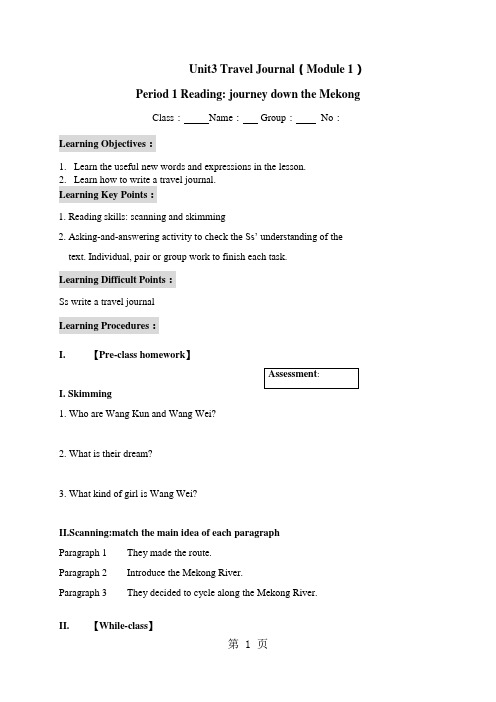
Unit3 Travel Journal(Module 1)Period 1 Reading: journey down the MekongClass: Name: Group: No:Learning Objectives:1.Learn the useful new words and expressions in the lesson.2.Learn how to write a travel journal.Learning Key Points:1. Reading skills: scanning and skimming2. Asking-and-answering activity to check the Ss’ understanding of thetext. Individual, pair or group work to finish each task.Learning Difficult Points:Ss write a travel journalLearning Procedures:I.【Pre-class homework】I. Skimming1. Who are Wang Kun and Wang Wei?____________________________________________________2. What is their dream?____________________________________________________3. What kind of girl is Wang Wei?____________________________________________________II.Scanning:match the main idea of each paragraphParagraph 1 They made the route.Paragraph 2 Introduce the Mekong River.Paragraph 3 They decided to cycle along the Mekong River.II.【While-class】Step1. Lead-inStep2. Group discussionSs discuss their pre-class homework in groupStep3 Consolidation: Reading comprehensionA. 阅读page18的Reading,并将下面的表格补充完整Journey down the MekongB.阅读理解(根据课文内容选择最佳答案)1 Who is the first one that had the idea to cycle along the Mekong River?A. Wang Kun.B. Dao Wei.C. Wang Wei.D. Wang Wei’s cousins.2 If they travel along the river, where will it become rapids as it passes through deep valleys?A. In Qinghai ProvinceB. In TibetC. In Yunnan ProvinceD. In Vietnam3 According to the atlas, what can they see during the trip?A. Glacier and waterfalls.B. Deep valleys.C. Hills and plains.D. Above all.4 Which of the following statements is NOT true?A. Taking the trip is a dream that comes true.B. They could see a lot along the Mekong River.C. Only a small part of the Mekong River is in China.D. They started in Qinghai where the river begins.5 The text mainly tells us that the anthor and his sister _______.A. plan and make preparations for their bike tripB. take a bike trip along the Mekong RiverC. do some research on the Mekong RiverD. are fond of cycling and travelingC.语法填空(根据课文内容完成短文)Wang Kun and Wang Wei 1._________ about taking a great bike trip ever since middle school. After (2) __________(graduate) from college, they finally got the chance to do it. It was his sister (4)______ first had the idea to cycle (4)______ the Mekong River from(5)_____ it begins to where it ends. The Dai live near the Lancang River, the Chinese part of the river that (6)________ (call) the Mekong River in other countries. Wang Wei soon got them (7)_______ (interest) in cycling too. She insisted that we(8)_______ (find) the source of the river. She gave me a (9)_________(determine) look. Once She has made up her mind, nothing can change it. Finally, I had to give (10) ______.Step4.PresentationStep5.SummaryIII.【Post-class】Self- reflectionI. Skimming1. They are brother and sister.2. To cycle along the Mekong river.3. Very stubborn.II. Scanning:Paragraph 1 They made the route.Paragraph 2 Introduce the Mekong River.Paragraph 3 They decided to cycle along the Mekong River.III.While-class (课堂教学流程)A.1. graduating 2. dreamed 3. a bike trip 4. mountain5. grew up6. is called7. other8. begins9. where 10. to breathB. CCDCAC. 语法填空1. 1. have dreamed2. graduating3.who/ that4. along5. where6. is called7. interested8. find9. determined 10. inPeriod 2 Language focus in Reading 1Class: Name: Group: No:______ Learning Objectives:1. Learn and grasp the important useful new words and expressions.2. Learn the important useful sentences and patterns.3. Make sentences after the useful expressions.Learning Key Points:Enable Ss to grasp the usages of such important new words and expressions. Learning Difficult Points:Get Ss to understand some difficult and long sentences.Learning Procedures:I.【Pre-class homework】A.1.persuade2.graduate3.prefer4. care about5. ever since6. give inB. 句子仿写1. Ever since middle school, my sister Wang Wei and I have dreamed about taking a great bike trip.仿写: 自童年起,她就一直梦想着能成为明星。
2017-2018学年人教版必修一Unit3traveljournal-reading课件(共21张PPT)

journal This is a travel _______________.
Wang Wei dream of taking a great bike Wang Kun and _____________’s ideas trip, but they have different _____________. They are preparing
Advantage cheaper than the airplane provides accommodation and meals … ship Disadvantages more expensive than the train or bus not convenient for visiting inland places …
Paragraph 2
1. What kind of person is Wangwei?
She is very stubborn.
2. Can you find some words to describe the feelings of Wang Wei about the trip?
determined, excited, interested
paragraph.
Please read the first paragraph and answer the following questions.
Paragraph 1
Qestion 1
How many people are there going for the trip?
Four. They are Wang Kun’s cousins What was their dream?
trip for the ____________.
人教版高中英语 必修一 Unit3 《Travel journal---Reading》 课件 (共43张PPT)
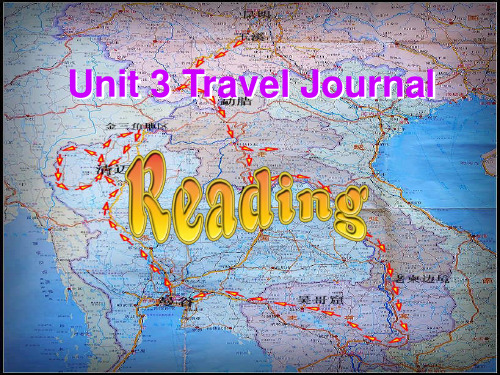
on foot by bike by bus by train by ship/sea by plane/air
Which kind of transport do you prefer to use: bus or train? Think about the advantages and disadvantages of each form of transport and fill in the chart.
Many people live beside a river. How do they make use of it in their daily life?
The world has many great rivers. If you could follow the route of only one of them, which one would you choose? Why?
Sample dialogue A: Tom, where are you going on holiday? B: I’m going to Laos. A: When are you leaving? B: Next Sunday. A: How are you going to Laos? B: I’m taking a plane. A: How long are you staying in Laos? B: About two weeks. A: Great. Have a good trip. B: Thanks.
When are you leaving? How are you going to …? When are you arriving in/at …? Where are you staying? How long are you staying in …? When are you coming back?
2017-2018学年人教版必修1Unit 3 Travel Journal Section II (共33张PPT)
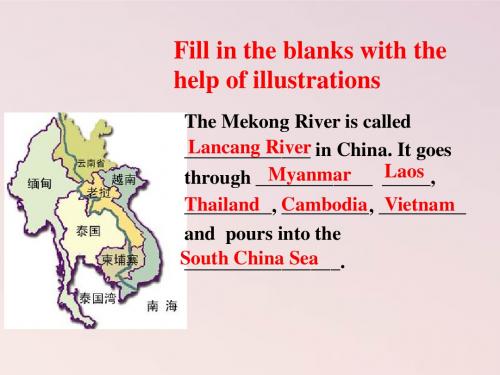
(4)表示“喜欢,反对,厌恶”,如:love,like,hate,want,
dislike,envy等。
如:
⑥We love our motherland deeply.
⑦They envy her good fortune.
三、现在进行时表将来的用法 1.动词come,go,arrive,leave,start,begin,
答案:takes
考查动词的时态。当根据(火车、
轮船、飞机等)时刻表将要发生的动作时,要
用一般现在时表示将来。
6.The Russian President ________(visit)
China next month.
答案:is to visit 考查动词的时态。be to
do表示按计划或安排将要发生的事。
vacation. 现在进行时表示 现阶段一直在进行的动作,虽然 说话时动作不一定正在进行。
3.⑤He is always changing his mind.
⑥He is forever thinking of others.
现在进行时与副词always,repeatedly,constantly,
决定的事。will用于各种人称,而shall仅用于第
一人称。
—I’m sorry.I forgot to post the letter for you.
—Never mind.I will post it myself this afternoon.
2.be going to do用来表示近期或事先考虑要做的 事情,以及有迹象表明将要发生的事。 Look at those black clouds;there’s going to
2017-2018学年人教版高中英语必修一Unit 3 Travel Journal Section III 课件 (共42张PPT)

D.snowmen in Tibet can ride bicycles
Language points
1.To climb the mountains was hard work but as
we looked around us,we were surprised by the
view.
view n.风景;视野;观点;见解
6. At one point we were so high that we found
ourselves cycling through clouds.
句中so...that...意为“如此……以至于……”,
that引导结果状语从句。
+adj.或 adv. (1)so +adj.+a (n )+单数可数名词 +many/few+复数可数名词 +much/little(少的)+不可数名词 a (n )+adj.+单数可数名词 (2)such adj.+不可数名词 adj.+复数名词 +that... + that...
词时宾语是人,表示“给某人穿衣”。
用put on, wear, have on, dress的适当形式填空 1.Hurry up and get ________. dressed
wore a puzzled look on his face. 2.He ________
Put on your coat. 3.Hurry up! ________ had on 4.He ________ nothing ________ when the door opened.
件地址。 (2)“ 主题 (Subject : )” 框的内容应简明地概括信 的 内 容 , 短 的 可 以 是 一 个 单 词 , 如 thanks , congratulations,greetings等;长的可以是一个 名词性短语,也可以是一个完整的句子,但一 般不超过 35 个字。 “ 主题 ” 框的内容切忌含糊不
人教版高中英语 必修一 Unit3 《Travel journal---Reading》 课件 (共43张PPT)

Transport Advantages disadvantages
1. very cheap 1. takes longer
bus 2. efficient for
than the train
short journeys or airplane
3. goes to small 2. does not
When are you leaving? How are you going to …? WhenБайду номын сангаасare you arriving in/at …? Where are you staying? How long are you staying in …? When are you coming back?
Many people live beside a river. How do they make use of it in their daily life?
The world has many great rivers. If you could follow the route of only one of them, which one would you choose? Why?
The Mekong River is called _L_a_n_c_a_n_g__R_i_v_er_ in China. It goes through __M__y_a_n_m__a_r__ _L_a_o_s_, _T_h_a_i_la_n__d_, C__a_m__b_o_d_ia_, _V__ie_t_n_a_m__ and pours into the _S_o_u_t_h_C__h_in__a_S_e_a__.
Wang Kun and _h_is_ _s_is_t_er_ Wang Wei are dreaming about _ta_k_i_n_g__a_g_r_e_a_t_b_i_k_e_t_r_ip_.
人教版高中英语 必修一 Unit3 《Travel journal---Reading》课件(共28张PPT)
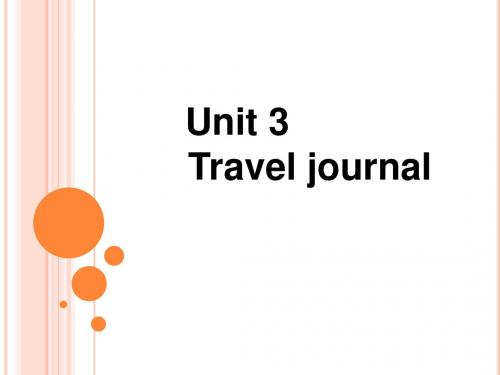
Read paragraph 3 and answer the questions.
What can they see during the journey?
It begins in a _g_l_a_c_i_e_r_
Where and How
They have the idea to _c_y_c_le__a_lo_n__g_the Mekong River from _w__h_e_r_e_ it _b_e_g__in_s to _w__h_e_r_e_ it _e_n_d_s_.
Read paragraph 1 and answer the questions.
Unit 3 Travel journal
The Holiday is Coming!
Tian’anmen Square
The Great Wall
Eiffel Tower
The Changjiang River –长江
What should you know before you plan to travel?
Think about the advantages and disadvantages of each form of transport and fill in the following chart.
Transport Advantages Disadvantages
bus train ship airplaቤተ መጻሕፍቲ ባይዱe
Thank you!
train
cheaper than the airplane, seeing views along the road, punctual, safe
人教版高中英语 必修一 Unit3 《Travel journal---Reading》课件(共28张PPT)
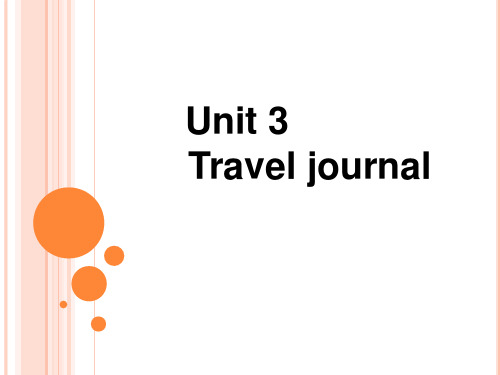
Disadvantages slow, dangerous,
seasick
Transport Advantages
airplane
fast, time-saving, comfortable
Expensive,
Disadvantages Airports are far from
the centre of the cities.
Unit 3 Travel journal
The Holiday is Coming!
Tian’anmen Square
The Great Wall
Eiffel Tower
The Changjiang River –长江
What should you know before you plan to travel?
Then, it begins to __m__o_v_e__ quickly. It becomes _r_a_p__id_s__ as it passes through
deep _v_a_l_l_e_y_s___.
1 Write a short summary of the reading text in less than 150 words. 2 Finish Exercise 1&2 on Page 20.
Think about the advantages and disadvantages of each form of transport and fill in the following chart.
Transport Advantages Disadvantages
bus train ship airplane
- 1、下载文档前请自行甄别文档内容的完整性,平台不提供额外的编辑、内容补充、找答案等附加服务。
- 2、"仅部分预览"的文档,不可在线预览部分如存在完整性等问题,可反馈申请退款(可完整预览的文档不适用该条件!)。
- 3、如文档侵犯您的权益,请联系客服反馈,我们会尽快为您处理(人工客服工作时间:9:00-18:30)。
新课讲解 教学目
标
The possible answers:
8. Why does Zhang Sha use the words special day on the last line in the letter of the invitation? Zhang Sha use the words special day on the last line in the letter of the invitation because this is the day earthquake happened thirtytwo years ago.
新课讲解 教学目
标
A letter of the invitation
Read the letter of the invitation quickly first, then work in pairs and answer the following questions. 5. When will the new park open? 6. Why will the City Government open the new park? 7. Who else are invited to attend the opening ceremony of the park? 8. Why does Zhang Sha use the words special day on the last line in the letter of the invitation?
导入新课 教学目
Answer these questions 1. Have you ever attended an English speech competition? 2. What's your topic of your speech? 3. Where did you participate in the speech competition? 4. I suppose you have won the competition, didn't you? 5. What's your opinion about the Self rescue after disaster?
标
新课讲解 教学目
The possible answers: 7. Who else are invited to attend the opening ceremony of the park?
标
The family and the friends of the student are also invited to attend the opening ceremony of the park.
导入新课 教学目
标
Look at the pictures please !
Think over what is the passage about.
导入新课 教学目
标
Look at the pictures please !
Think over what is the passage about.
导入新课 教学目
Answer these questions 2. What's your topic of your speech? The topic of the speech was about the Self rescue after disaster. 3. Where did you participate in the speech competition? I participated in the speech competition in our school.
标
导入新课 教学目
Answer these questionspeech competition?
标
Yes, I have. I attended the English speech competition last term.
新课讲解 教学目
The possible answers: 1. What does the letter of the invitation tell us? The letter of the invitation tells us that the student is invited to speak to the park visitors when the 2. Who sent the letter of the new park opens. invitation to the student? Zhang Sha, an officer of the City Government, sent the letter of the invitation to the student.
标
新课讲解 教学目
标
A letter of the invitation
Read the letter of the invitation quickly first, then work in pairs and answer the following questions. 1. What does the invitation tell us? 2. Who sent the letter of the invitation to the student? 3. Why does Zhang Sha invite the student to speak to the park visitors? 4. How many judges were there in the judge group when the student gave the speech?
新课讲解 教学目
The possible answers: 5. When will the new park open? The new park will open on July 28 at 11:00 am next month. 6. Why will the City Government open the new park? The City Government will open the new park to honour those who died in the terrible disaster, and will also honour those who helped the survivors.
标
导入新课 教学目
标
Answer these questions
4. I suppose you have won the competition, didn't you?
Yes, of course. I won the first prize in the competition.
导入新课 教学目
巩固提升 教学目
The key words and expressions 3. judge n. 法官;评委;裁判员;鉴定人 v. 审判;评判;评价 A panel of judges is now selecting the finalists. 评判小组现在正在选拔参加决赛选手。 The judge dismissed the suit. 法官驳回了诉讼。 A grade B judge could only be allowed to judge alongside a qualified grade A judge. B级裁判只能协同有A级资质的裁判进行评判。
标
新课讲解 教学目
The possible answers: 3. Why does Zhang Sha invite the student to speak to the park visitors?
标
The student has won the high school speaking competition about new Tangshan.
新课讲解 教学目
The possible answers: 4. How many judges were there in the judge group when the student gave the speech?
标
There were five judges in the judge group when the student gave the speech.
巩固提升 教学目
The key words and expressions 1. congratulation n. 贺词;祝贺;恭喜 The letter arrived in congratulation of my graduation from the university. 我收到了大学毕业的贺信。 This is a matter for congratulation. 这是件值得庆贺的事。 I sent her a gift as a token of my congratulation. 我给她寄去一件礼物表示祝贺。
标
导入新课 教学目
Answer these questions 5.What's your opinion about the Self rescue after disaster? Therefore, we must take some water with us. If conditions permit, we would take some cakes, clothes, torch, money or cards etc. And we would feel sad or sorry if a disaster happens, but we should keep our head clear and find the place of the triangle area nearby to protect ourselves. We should be under the furniture, or in the corner to wait the rescue team help us ...
